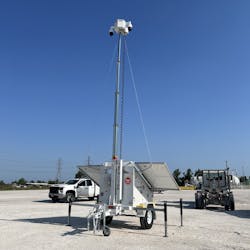Construction site theft is a billion-dollar-a-year problem and growing, according to a report from the National Equipment Register. Often, it is not the loss of materials or equipment that comes as the greatest hit to the budget, but instead it is interruptions in operational continuity.
Content provided by Stallion Infrastructure Services
When it comes to protecting construction sites from an attack, a range of options from CCTV systems to 24-hour security guards are often deployed. CCTV security installations have typically focused on “inside the perimeter” protection and often lack the teeth needed to be a deterrent. That is changing with new mobile security trailers, loaded with advanced artificial intelligence (AI) monitoring capabilities that can greatly expand the scope of on-site security. Plus, these smart systems are also proving to add operational efficiencies.
On top of the surge in criminal activities targeting the construction industry is the nationwide shortage of law enforcement. This has the potential to increase response times and puts additional pressure on job sites to fortify their security practices.
Mobile security trailers, which have become common in retail parking lots in recent years, are now increasingly the go-to equipment for the construction industry as well. Made up of a trailer armed with high-definition cameras attached to an extendable mast and powered by solar panels, these systems can be quickly deployed and set up in minutes. They can also be repositioned as threat profiles change.
Mobile security trailers are not new, but sophisticated data analytics is changing how these intelligent systems operate and is enabling a more efficient approach to securing a job site.
Read also: AI broadens effectiveness of theft prevention
According to Cameron Simon, SVP of industrials, technology, and services for Stallion Infrastructure Services, the current trend in construction is reminiscent of the retail industry’s surveillance practices. Althouth it has been a customary practice to install numerous cameras inside stores, businesses are now equally keen on monitoring the activities of individuals in the parking lot perimeter or access points before they even enter the premises.
The latest AI-enabled technology provides an opportunity for companies to have real-time, continuous monitoring of their projects, people, assets, and environment. This may include identifying whether or not someone is brandishing a weapon, which is now possible with advanced AI systems. These systems can also alert on vehicles, people, and motorcycles as well as spot smoke and fire—which are always a concern at any project.
For the construction industry, stopping a potential attack, theft, or property damage is a real concern, yet it is the potential loss of uptime or business continuity that keeps operators pushing out more security trailers onto their properties.
“Recently, we deployed at a remote facility where some expensive assets were staged for an upcoming project. Someone came in attempting to steal some electronics,” said Simon. “It was a couple of hundred thousand dollars worth of equipment that we prevented from being stolen.”
Stallion’s advanced analytics detected the intruder before he entered the property, then the virtual-guard monitoring team took over, coordinating with the on-site customer team to proactively apprehend the thief, preventing the crime and potential losses.
The real value is not just stopping an equipment theft, according to Simon. The replacement of the machine, although costly, may be just a small amount when compared to the domino effect of having to then push back other aspects of the project that are dependent on the work that machine was to do.
“Now they’re not on time, not on budget, and the contractor cannot fulfill his contract,” said Simon.
The way in which security monitoring trailers are rolled out is in stark contrast to that of traditional CCTV which was built and designed to be fixed installations that often blended into the surroundings.
Simon emphasizes the significance of deterrence as the primary defense against potential security threats. Traditional CCTV cameras often act as passive observers, but with the introduction of mobile security trailers, the situation is different.
These trailers are highly visible, sending a clear message that they are actively monitoring the area. The aim is to make people aware of their presence, ensuring that potential wrongdoers are discouraged from carrying out any illicit activities.
Popular deterrent features include motion-activated strobe lights and talk-down speakers that can announce that police or security have been alerted to someone’s presence.
“At the same time those on-trailer features take action, an alert gets sent to a central monitoring center where trained professionals take over for AI,” says Simon. “They can then quickly review the incident and determine actionable next steps in real-time.”
Those next steps are typically customized for each facility and may include contacting security guards, local police, or customer representatives.
Beyond just security, the AI systems on the advanced monitoring trailers can also provide operational efficiencies. For example, the unit can alleviate congestion from multiple deliveries that occur at the same time. It can also provide heat mapping of activities to make changes to operational workflows.
“There are some job sites that simply need an extra set of eyes out there looking out for environmental exposures, spills or failures on a piece of equipment,” adds Simon. “These advanced systems are not limited to just anti-theft or anti-vandalism. They are truly a second set of eyes and ears out there.”
PPE compliance can also be managed by security monitoring trailers.
In addition, mobile monitoring trailers offer another notable advantage: the ability to swiftly exchange them in case of maintenance issues. For example, Stallion has strategically positioned nationwide operational facilities and can quickly provide replacement trailers with high-end commercial-grade cameras and software infrastructure, if needed. To ensure maximum uptime, the company also conducts a daily virtual “pulse check“ on each system within its extensive fleet across the country to guarantee uninterrupted operation.
“Is the unit charging adequately? Are the batteries working optimally? Are the cameras and the system working and free of visual obstructions?” said Simon. “If your systems aren't working properly, that's a potential failure point we intend to proactively manage and prevent.”
Another common failure point is connectivity. Trailers should be able to connect with more than just a single cellular service. Simon suggests finding a supplier that can use multiple carriers as well as low-earth orbiting satellites and point-to-point connections for redundancies. This also allows users to log in from anywhere and check in on the facility through a secured portal.





